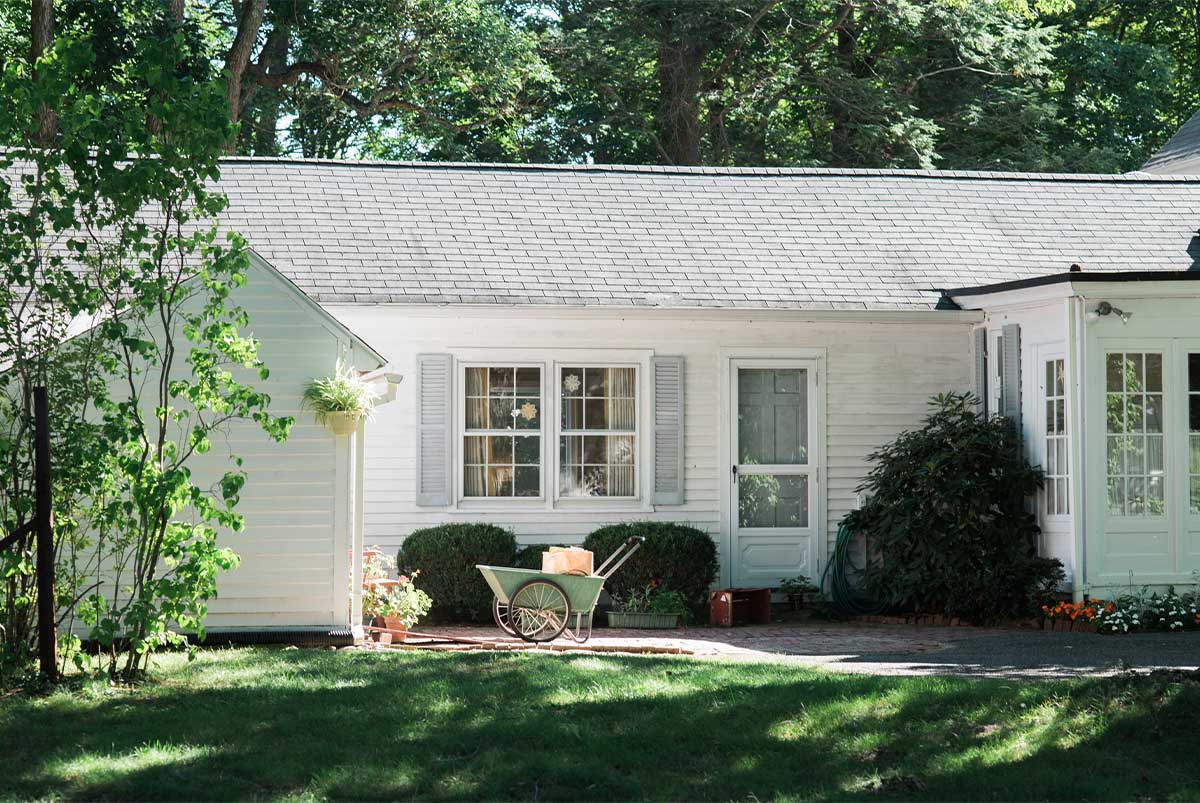Ready To Buy a Home?
Get Approved to Buy a Home
Rocket Mortgage® lets you get to house hunting sooner.
Whether you’re new to homeownership or you’re a seasoned homeowner, there is a lot to learn when it comes to the ins and outs of a mortgage (aka the loan that gets you a home).
Before you apply for a mortgage, it’s important to research the different types of available mortgages and the requirements for mortgage loan approval. The varieties are endless. Some mortgages can help you buy the house you plan on calling “home” one day. And some mortgages can help you buy second homes, rental properties or investment properties.
For most of us, our first and most important mortgage is our primary residence mortgage. Your primary residence is the house you live in for most of the year.
A primary residence mortgage helps you buy a home for personal or family use – not for use as a rental or vacation home. And you can only have one primary residence. Understanding what a primary residence mortgage is can be the key to getting your hands on the cash you’ll need to buy a home, make a lower down payment and save tens of thousands of dollars in taxes when you sell it.
Do you want to know how to qualify for a primary residence mortgage? Let’s get into it.
How Do You Qualify for a Primary Residence Mortgage?
Explore Your Mortgage Options
What are you looking to do?
The type of house you buy can influence two things: the type of mortgage loan you apply for and what your lender will look for during the mortgage approval process. Mortgage lenders consider your primary residence the place you move into within 60 days of purchase and live in for most of the year.
To qualify for a primary residence mortgage, your house may need to meet requirements outlined by the IRS, including[1]:
- It’s your main residence, your home. The place where you hang out the most.
- The home address is – or will be – listed on your voter registration, driver’s license and your federal or state income tax returns.
- The home is near your job or one or more family members.
What Are the Benefits of a Primary Residence Mortgage?
Having a primary residence mortgage opens you up to some pretty sweet homeowner and taxpayer benefits.
Lower mortgage interest rates
A primary residence mortgage usually has a lower interest rate and property tax rate than an investment property or second home mortgage.
Primary residence mortgages are considered lower-risk loans compared to other loans. Lenders know homeowners will typically prioritize paying for their primary residence over other loans or investments because they want to keep their roof over their heads. You should score a lower mortgage interest rate than you would if you were buying a second home or an investment property. And you might pay less real estate tax with a residential mortgage.
Lower down payment required
In many cases, the down payment for a residential mortgage is lower. Lowering the down payment hurdle can help lots of borrowers get into a new home a lot faster, which is why conventional lenders can offer primary residence mortgage loans that require as little as 3% down.[2]
There are plenty of loan options available for primary residences, including conventional loans you can get from a bank or mortgage lender as well as government-insured loans, including:
- Department of Veterans Affairs (VA) loans
- Federal Housing Administration (FHA) loans
- U.S. Department of Agriculture (USDA) loans
And here’s another benefit: You can usually qualify for a primary residence mortgage with a lower credit score (generally around 620)[2] than the qualifying credit scores for other mortgage types. The lower credit score requirement is a chance to get your feet wet in the housing market before diving into owning multiple homes or investment properties.
You can also qualify for more tax deductions than you would with second home mortgages.
Take the first step toward buying a home.
Get approved. See what you qualify for. Start house hunting.
How Do Taxes Work With Primary Residences?
When you sell your primary residence, the taxes you can expect on what you make may seem daunting. Fortunately, some significant exemptions are available to help you hang on to your cash. Understanding the tax laws is vital to saving some money over the long run.
Capital gains tax, explained
If you’ve got a primary residence mortgage, you may be able to deduct some capital gains when you sell the house by taking advantage of the principal residence exemption offered by the IRS.
Capital gains is the tax the IRS typically charges when you sell an asset, such as your house. This tax, which can eat up as much as 20% of your profit, is owed when you sell an asset that increased in value while you owned it.
The IRS calculates the tax based on a few factors, including your income and net profit. While home sellers in the lowest income brackets might qualify for 0% tax on their capital gains, others could be on the hook for 15% – 20% in taxes.[3]
How to save on capital gains with your primary residence
The IRS lets you exclude up to $250,000 in capital gains on a primary residence if you’re single. If you’re married and filing as a couple, you can exclude up to $500,000. This is often referred to as the primary residence exemption or homestead exemption.[1]
To qualify for the primary residence exemption from capital gains, you must meet a few requirements[1]:
- You owned the home for at least 2 out of the 5 previous years.
- The house has been your primary residence for at least 2 out of the 5 previous years.
- You only claimed capital gains exclusions once every 2 years.
The 1031 exchange of property
If you’re an investment property owner, you may be able to avoid or defer capital gains taxes, too. You can do this by completing a 1031 exchange.
In a 1031 exchange, you sell your investment property and buy another one. The trick is to do both within a certain time frame. There are a few important things to keep in mind about 1031 exchanges[4]:
- The properties must be considered “like-kind” (read: property that is the same type) by the IRS to qualify for an exchange.
- There’s no limit to how often you can do a 1031 exchange.
Homestead Tax Exemption
The homestead tax exemption available in some states applies to the property taxes on your primary residence rather than your income taxes. This tax provision exempts part of your home’s value from property taxes.
In some states, a specific dollar amount is exempt from property taxes, while in others, the homestead tax exemption is determined by percentage. The former may be of more value to you if your home is less expensive, while the percentage method is typically more advantageous to homeowners with pricier homes.
For example, let’s say your home is assessed at $300,000 by your local property tax assessor’s office, and your property tax is 2% of the assessed value. That means your property tax is $6,000 per year.
However, if your state offers a 25% homestead tax exemption, your assessed value is reduced to $225,000 for tax purposes. At 2%, your property tax becomes $4,500 per year, saving you $1,500.
States vary wildly in the homestead tax exemptions they offer. Hawaii, for instance, offers a homestead tax exemption of up to $100,000, while the Delaware exemption maxes out at $400.
In many states, the homestead tax exemption is limited to certain groups of people, including older adults, disabled homeowners, veterans and those whose income falls under certain caps.
Most homeowners are eligible for some sort of homestead tax exemption in Alabama, Arkansas, California, Florida, Georgia, Hawaii, Illinois, Indiana, Iowa, Louisiana, Maine, Mississippi, Montana, New Mexico, Oklahoma, Pennsylvania, Texas, Utah, Vermont, Washington, D.C. and Wisconsin.
What if I Don’t Use It as a Primary Residence?
If you’re in the market for a house, an apartment or other property you plan to use while you’re on vacation or visiting family, you might be wondering if you can bend the rules a bit to reap the benefits of a primary residence mortgage.
Let’s be clear: There should be no bending of the IRS rules around principal residence requirements. It would be a dangerous mistake. Lying about your primary residence is considered occupancy or mortgage fraud.
If the IRS discovers you deliberately made false claims to your lender about the use of the residence, there’s a good chance you’ll face fines – or even jail time.
Knowing the Rules Will Make You a More Confident Buyer
Understanding what a primary residence is and what you need to qualify for a primary residence mortgage can help you feel a lot more comfortable during the home buying process.
But knowing is only half the battle. The other half is confidently using what you know to make the best money moves and decisions on your journey to homeownership.
The Short Version
- A primary residence mortgage helps you buy a home for personal or family use – not for use as a rental or vacation home
- Mortgage lenders consider your primary residence the place you move into within 60 days of purchase and live in for most of the year
- A primary residence mortgage usually has a lower interest rate and property tax rate than an investment property or second home mortgage
Internal Revenue Service. “Publication 523 (2020), Selling Your Home.” Retrieved June 2022 from https://www.irs.gov/publications/p523
Fannie Mae. “HomeReady Mortgage.” Retrieved January 2022 from https://singlefamily.fanniemae.com/originating-underwriting/mortgage-products/homeready-mortgage
Internal Revenue Service. “Topic No. 409 Capital Gains and Losses.” Retrieved June 2022 from https://www.irs.gov/taxtopics/tc409
Internal Revenue Service. “Like-Kind Exchanges – Real Estate Tax Tips.” Retrieved June 2022 from https://www.irs.gov/businesses/small-businesses-self-employed/like-kind-exchanges-real-estate-tax-tips




